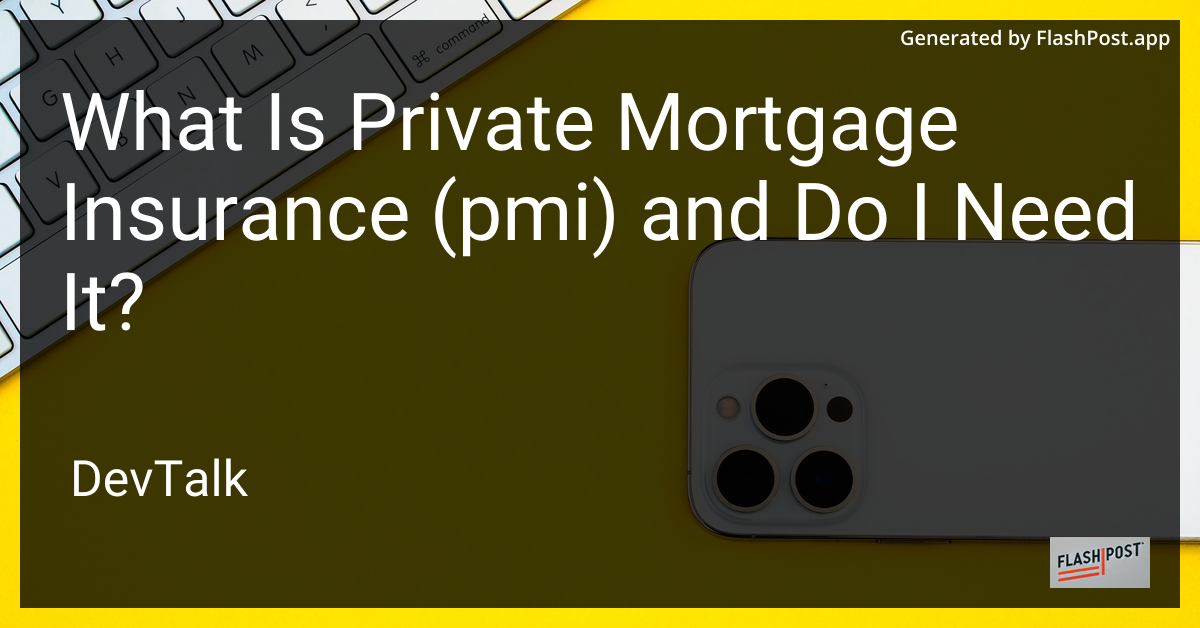What Is Private Mortgage Insurance (pmi) and Do I Need It?
 # What is Private Mortgage Insurance (PMI) and Do I Need It?
# What is Private Mortgage Insurance (PMI) and Do I Need It?
When venturing into home ownership, you might encounter an additional cost known as Private Mortgage Insurance (PMI).
For many potential homeowners, understanding PMI and its implications can be crucial in making informed financial decisions. This article will break down what PMI is, why it might be necessary, and whether or not you need it.
What is Private Mortgage Insurance (PMI)?
Private Mortgage Insurance (PMI) is a type of insurance that protects lenders from the risk of loss if a borrower defaults on their mortgage. It's typically required for homebuyers who put down less than 20% of the home's purchase price as a down payment. Since these buyers are considered higher risk, the insurance acts as a safeguard for the lender.
Why is PMI Required?
Lenders typically require PMI to minimize their risk. With less than 20% equity in the home, there is a higher likelihood that the lender could face financial loss if the borrower defaults and the home goes into foreclosure. By requiring PMI, lenders can mitigate potential losses.
How Does PMI Work?
PMI payments are usually included in the monthly mortgage payment, though there are other options like upfront payments or a combination of both. The amount of PMI varies based on several factors, including the loan amount, down payment size, and the borrower’s credit score. Generally, PMI can cost between 0.3% to 1.5% of the original loan amount annually.
Do I Need PMI?
Whether you need PMI depends on the size of your down payment. If you’re putting down less than 20%, you will likely need to pay PMI. However, there are ways to avoid PMI, such as:
-
Increasing Your Down Payment: Striving for a 20% or more down payment eliminates the need for PMI.
-
Piggyback Loans: Using a second mortgage to cover the down payment can help avoid PMI, although this option may have higher interest rates.
-
Lender-Paid PMI: Some lenders offer an alternative where they pay the PMI but charge a higher interest rate.
How Long Do You Have to Pay PMI?
PMI isn’t a permanent requirement. Once you reach 20% equity in your home, you can typically request to have the PMI removed. By law, PMI must automatically be terminated when your equity reaches 22%, based on the original purchase price or appraised value at loan purchase.
Benefits and Drawbacks of PMI
Pros:
- Affordability: PMI enables homebuyers to purchase a home with a smaller down payment.
- Home Ownership: For many, PMI is a manageable cost that opens the path to homeownership sooner.
Cons:
- Additional Cost: PMI adds to the monthly financial obligations of the homeowner without any direct benefit for the borrower.
- Qualification: The qualifications for PMI could be stricter than those for the mortgage itself.
Alternative Financial Solutions
If you're exploring various financial products and loans while considering home ownership, it's beneficial to also understand alternative financial solutions, particularly in evolving markets such as 2025. Here are related resources that could be informative:
-
Discover how a payday loan rollover might affect financial planning.
-
Learn about options for borrowing money even if unemployed and understand the risks involved.
-
Explore the benefits of same-day loans to quickly address financial emergencies.
Conclusion
Private Mortgage Insurance is an important consideration for any potential homeowner who cannot afford a 20% down payment. While it does add to monthly expenses, it can also facilitate earlier entry into the housing market. Carefully assess your financial situation, explore all available options, and consult with your lender to make the best decision for your future home ownership journey.